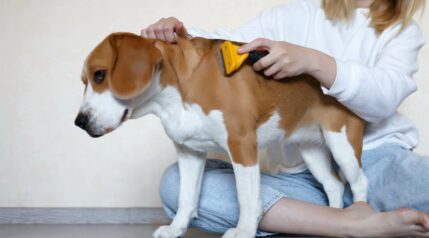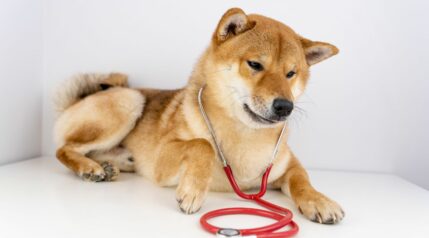Being a pet parent is a big responsibility, and with it comes many health concerns. Are they a healthy weight? Are they prone to dental disease?
This guide looks at some of the most common health problems in dogs and how to avoid or prevent them from keeping your four-legged friend happy and healthy. We also give you tips on what to do to treat them and when it’s time to see a vet.
So without further adieu, let’s find out what health issues your dog might be prone to and how to minimize your and your dog’s concerns.
Obesity

It can be tricky to find the right balance, and many pet parents worry that they are over or under-feeding their dog. Overfeeding is the most common cause of weight gain in dogs. And over time, weight gain and obesity can have severe health risks for your pet, such as heart disease, diabetes, and joint problems.
Dogs come in all shapes and sizes, and it can be hard to know the ideal body weight for your pet. Your veterinarian can help guide you by weighing your pet and assessing his overall body condition. And when it comes to exercise, it depends on the breed, size, and age of your pet. But all dogs need a good off-leash run at least once a day.
We love to reward and treat our pets, but this is often where the problems begin as all these extras start to add up. Only around 10% of your dog’s daily food intake should include treats. Manufacturers of commercial dog foods display handy guides on the packaging or on their websites, which are easy to use and follow if you are unsure how much food is right to give your dog. Your veterinarian can also help to guide you if you are unsure.
If your pet has piled on a few extra pounds, your vet can help you formulate a diet and exercise plan to ensure that your dog is still getting all the nutrients he needs while burning off some extra calories and getting back down to a healthy weight. You might also consider a weight management dog food.
Dental Disease

Most people are probably familiar with that smell of doggy breath. But how do you know if your dog has gum disease, and when should you worry?
Your veterinarian should check your dog’s teeth every year at his annual checkup. Bad breath can be one of the earliest signs of dental disease and a sign that you should get your dog’s teeth checked out. Other signs to look out for include difficulty eating dried/hard food, bleeding gums, loss of teeth, drooling a lot, pawing at the mouth/face, and blood on toys or saliva. If left untreated, gum disease can be painful and may mean that your pet has to have some teeth removed under anesthetic.
How Can I Prevent Dental Disease?
Preventing gum disease in our four-legged friends is just like it is for us – good oral hygiene. Regularly brushing your dog’s teeth to remove the bacteria that can lead to plaque buildup helps prevent gum disease from developing. It is not easy for most pet parents to brush their dogs’ teeth daily, and many dogs won’t tolerate it well. However, there is a range of different types of toothbrushes and food supplements, so there is something out there for every dog.
Diet is also an essential part of your dog’s oral care – dried food such as kibble helps to chip away any plaque or tartar that might be building up on your dog’s teeth.
Your veterinarian may offer dental treatment at the clinic to prevent further problems if your dog has a significant buildup of plaque or signs of gum disease. This involves a general anesthetic so that the vet can adequately assess the teeth and then clean and scale them before polishing them.
Ear Infections

The first sign that usually makes pet parents worry about a possible ear infection is head shaking. Common signs that your dog may have an ear infection include head shaking, scratching at the ears more than expected, an unpleasant smell coming from the ears, and redness or discharge around the ear.
A trip to the veterinarian is essential if you notice any of these symptoms, as ear infections are uncomfortable for your pet and can be tricky to treat if they are left too long. The vet looks into your dog’s ears and might want to take a sample under the microscope to identify the type of infection.
Typically ear infections are treated easily with antibiotic ear drops from your veterinarian. The vet also cleans your dog’s ear thoroughly and recommends that you come back to have the ear checked and cleaned again after finishing the course of treatment. Some severe or recurring ear infections occasionally need further treatment.
What Causes Ear Infections In Dogs?
Dogs with long hairy ears, such as Spaniels and Retrievers, are often prone to ear infections as their ears are warm and moist – a perfect place for bacteria and yeast to grow. Allergies can also be a common cause of ear infections in dogs and parasites (ear mites), conditions that make your dog’s immune system weaker, and spending a lot of time in water.
How Can I Prevent A Dog Ear Infection?
Staying away from water, keeping up with your pet’s parasite treatments, and identifying underlying allergies can prevent your dog from getting an ear infection. You can also use ear cleaners and cotton wool to remove excess wax from your dog’s ear, but remember every dog is different, and some dogs need this done more regularly than others. You should always speak to your veterinarian before using any ear cleaning product to ensure it is suitable for your pet.
Anal Gland Impaction

They’re a bit of a stinky topic, but many pet parents worry about whether or not their dog’s anal glands are causing them problems.
If you’ve ever noticed a nasty fishy smell coming from your dog’s back end, it’s likely coming from his anal glands. Other signs of problems in this area include scooting and excessive licking. If they get too full, it’s uncomfortable, but it can also lead to infections and abscesses forming in the glands.
Anal glands are tiny sacs that sit on either side of a dog’s anus, just underneath the skin, and are full of a thick, smelly liquid. It may sound disgusting, but they use these glands to identify each other and mark their territory. Typically, the glands empty when your dog does a poo, as the pressure on the glands as they go forces the liquid out. But they can also empty when your dog is very stressed or scared.
What Can Cause Anal Gland Impaction?
There are many reasons why your dog might not be expressing his anal glands naturally and might need this done at the veterinary clinic. Diarrhea can mean that your dog doesn’t empty his glands naturally. Your dog may also have a food or environmental allergy that can cause them to get backed up.
Some dogs have slightly abnormally positioned glands, which means they are less likely to empty as he goes to the toilet. Some breeds might also be more susceptible, including Cavalier King Charles Spaniels, Cocker Spaniels, Spaniel Poodle crossbreeds, Shih Tzus, and Bichons Frises.
Adding a high-fiber food or natural fiber such as pure pumpkin puree to your dog’s diet can help bulk and firm up their poops, meaning it’s more likely that the glands express themselves naturally when they go to the toilet. Making regular trips to the veterinarian to get your dog’s glands expressed also helps prevent them from getting too full.
If they do become infected, they can easily be treated with an antibiotic course from the vet.
Overgrown Claws

Our dogs’ wild ancestors would have worn down their claws by running, hunting, and scratching at trees, but our modern domestic dogs don’t naturally wear them down enough.
Long claws can not only be uncomfortable for your pet, but they are more prone to breaking, splitting, and becoming infected. So, it’s essential to keep an eye on your pets’ claws and trim them regularly.
Every dog is different, and some need their claws trimmed every few months, while others might only need theirs cut a couple of times a year. Walking your dog on hard surfaces such as roads and sidewalks can help to wear them down naturally.
Fleas

Dogs often catch fleas from other dogs through close contact, as fleas can jump from one host to another. Adult fleas can quickly lay large numbers of eggs (hundreds), hatch out into larvae, and then develop into adults. These eggs can fall off your pet’s fur into the environment, such as their bedding, making it hard to get rid of the infestation.
How Do You Know If Your Dog Has Fleas?
You might notice that your dog frequently stops for a scratch, even pulling out clumps of fur. Sometimes the skin can become red and sore, and you often see adult fleas in your dog’s fur.
What Should You Do If Your Dog Has Fleas?
If you think your dog has fleas, you should treat him with a suitable flea treatment. This kills adult fleas, and many products also destroy the eggs and larvae. There are several different types of flea treatment available, so there is something to suit every dog, and your veterinarian can help guide you as to which is best for you.
Final Thoughts
Many different health concerns can rear their ugly heads throughout your dog’s life. But remember, your veterinarian is always available to help out if you have questions or worries. Check out our various other guides to find more information on how to keep your pup feeling his happiest, healthiest self.





